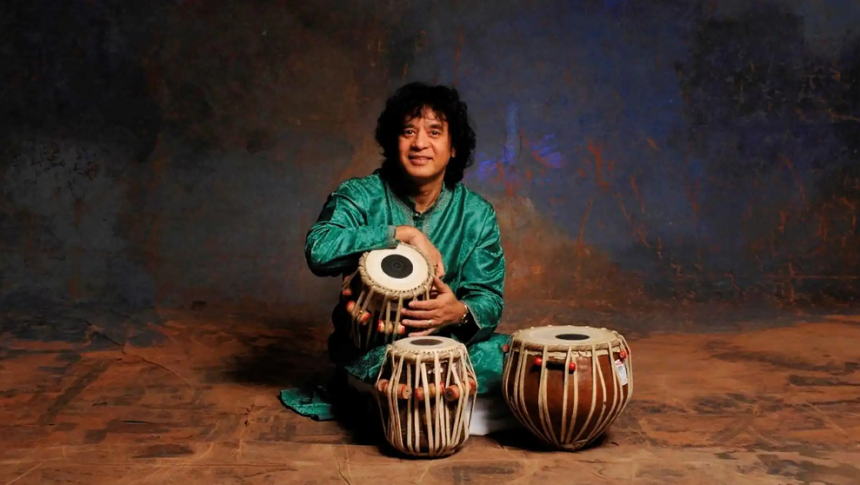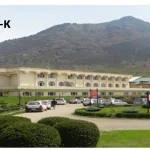TRIBUTE
There are lives whose rhythms are so profound that they transcend generations, echoing through time like an eternal beat. Ustad Zakir Hussain, the legendary tabla virtuoso, was one such luminary, whose art touched the very essence of music, transforming rhythm into something divine, something ineffable. It is not often that the world witnesses an artist who can take an instrument as humble as the tabla and elevate it to the heavens, creating a symphony that speaks of tradition, innovation, and the unbounded spirit of creativity. Today, as the world stands still at the news of his passing, it is not merely mourning a man, but the very rhythm of the universe that seems to pause for a moment, catching its breath.
Born on March 9, 1951, in the vibrant city of Mumbai, Zakir Hussain was destined for music. The rhythms of life coursed through his veins from the moment of his birth, for his father, Ustad Alla Rakha, was already a towering figure in the world of tabla. It was in the warm confines of his childhood home that young Zakir first heard the rhythmic bols—syllables that form the language of the tabla—being spoken and played. The room itself would pulse with sound, as if the walls absorbed and echoed each beat, cradling the young prodigy in music’s embrace.
His training began under the watchful, loving eyes of his father. Ustad Alla Rakha was a strict teacher, for he knew that true mastery required discipline. Young Zakir would spend hours practicing, his small hands dancing over the taut drumheads until his fingers swelled and ached. Yet, there was something extraordinary about this boy. Even as a child, he possessed a magical understanding of rhythm—an ability to not only play the tabla but to speak through it. Each beat seemed to carry the depth of an ancient tradition, yet it was imbued with a freshness that only he could summon. His father recognized it early: Zakir was not just talented; he was chosen.
What set Ustad Zakir Hussain apart from the very outset was his ability to infuse the tabla with life. In his hands, the instrument was no longer a drum; it became an extension of his soul. His fingers moved with a grace and precision that seemed almost otherworldly, as though he had struck a deal with the gods of music themselves. The soft ‘na’ whispered secrets, the resonant ‘dha’ thundered with power, and the intricate ‘tira-kita’ spun webs of magic in the air. Audiences would sit enraptured, their senses overwhelmed by the fluidity of his rhythms. He did not merely play the tabla; he conversed with it.
The tabla is an instrument of deep complexity, a balance of tones and time that demands both mathematical precision and profound emotion. For most, it serves as an accompaniment, a supporting presence beneath the grandeur of melodic instruments or the human voice. But Ustad Zakir Hussain defied convention. He lifted the tabla out of its supporting role and placed it center stage, proving that rhythm itself could be a melody, a song, a story. His solos were nothing short of a spectacle—long, intricate, and breathtakingly alive. The hall would be filled with the galloping sound of his fingers, a rhythm so rapid and precise that it felt as though the instrument had taken flight, soaring into the realms of the divine.
While Ustad Zakir Hussain remained deeply rooted in the traditions of Hindustani classical music, he was never bound by its borders. He saw music as a universal language—a thread that connected humanity across cultures, continents, and centuries. His curiosity and creativity led him to collaborations that would redefine global music forever.
In the 1970s, Zakir Hussain joined forces with legendary guitarist John McLaughlin to form Shakti, a fusion group that blended the intricacies of Indian classical music with the improvisational freedom of jazz. The result was nothing short of revolutionary. In Shakti, Zakir’s tabla became a bridge between East and West, a symbol of unity through sound. Audiences around the world, many of whom had never encountered Indian music before, were mesmerized by the energy and complexity of the rhythms he conjured. His beats were like poetry—sometimes soft as rain, sometimes fierce as a monsoon, always carrying within them the soul of his culture.
His collaboration with Mickey Hart of ‘The Grateful Dead’ further expanded his musical boundaries. Together, they explored the ancient and universal power of rhythm, producing the groundbreaking album Planet Drum. The project was a global celebration of percussion, bringing together rhythms from Africa, India, and Latin America. Planet Drum was not just an album; it was a testament to the interconnectedness of human creativity. For this work, Zakir Hussain was awarded the prestigious Grammy Award, a moment that symbolized his success in bringing Indian rhythms to the global stage.
His musical journey also brought collaborations with cellist Yo-Yo Ma, saxophonist Charles Lloyd, and the renowned quartet of Béla Fleck (banjo), Edgar Meyer (double bass), and Rakesh Chaurasia (flute). Most recently, he won two Grammy Awards this year—Best Global Music Album for Shakti’s ‘This Moment’ and Best Contemporary Instrumental Album for ‘As We Speak’. In total, Ustad Zakir Hussain was the recipient of four Grammy Awards, a testament to his unmatched artistry and global impact.
Behind the artist’s brilliance was a man of great humility and wisdom. Despite his stature as one of the greatest musicians of all time, Ustad Zakir Hussain carried himself with an effortless grace. His eyes, always twinkling, reflected both his passion for music and his deep understanding of life. He spoke often about the spiritual nature of rhythm, describing it as the heartbeat of the universe. To him, music was not mere entertainment; it was a meditation, a path to the divine.
In one of his many interviews, he once said, “Rhythm is all around us. It is in the beating of our hearts, in the ticking of the clock, in the flow of the river. Music is not created; it already exists. We merely become vessels to express it.” This profound philosophy shaped his art. When he performed, he was not playing for fame or applause; he was surrendering himself to the music, allowing it to flow through him like a river of sound.
The accolades and honors that Ustad Zakir Hussain received during his lifetime were countless. From India’s Padma Shri and Padma Bhushan to the Sangeet Natak Akademi Award, he was celebrated as a national treasure. Internationally, he was awarded the National Heritage Fellowship, the highest honor for traditional arts in the United States. Universities across the world bestowed honorary doctorates upon him, recognizing his unparalleled contributions to music and culture.
And now, the hands that gave life to the tabla have stilled. The maestro has taken his final bow, leaving behind a void that feels impossible to fill. Yet, in the silence that follows his passing, there is still music. Close your eyes, and you can hear it—the soft whisper of the ‘na’, the thunder of the ‘dha’, the joyous dance of the ‘tira-kita’. It is as though the very air holds the memory of his rhythms, refusing to let them fade.
For a man like Ustad Zakir Hussain does not truly die. He becomes a part of the music he loved so dearly. His rhythms live on in every tabla that is played, in every artist who dares to dream of a world connected through sound. His legacy is a heartbeat that will continue to pulse through time, reminding us that music is eternal, and that rhythm is the language of the soul.
As we bid farewell to Ustad Zakir Hussain, we do so not with sorrow, but with gratitude. Gratitude for the beauty he brought into the world, for the inspiration he gave to countless artists, and for the way he made us feel—connected, alive, and in awe of the magic that music can create.
The tabla rests now, but its echoes remain. The great maestro has returned to the divine silence from which all music is born, yet his rhythms will forever dance in the hearts of those who listened. To say that Zakir Hussain has left us is to misunderstand his essence. He is the rhythm that pulses through life, the music that connects us all. And as long as there is sound, as long as there is rhythm, the spirit of Ustad Zakir Hussain will live on.
(Author is a columnist and can be reached at: [email protected])








